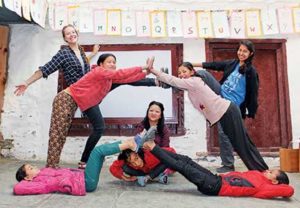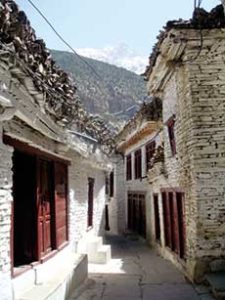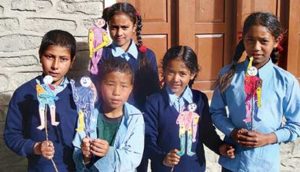Snehal Vadher
In the years 2016 and 2017, I volunteered as an English and Creative Lessons teacher for six months with The Marpha Foundation, an NGO in the Mustang district of Nepal. It is hard to speak about Mustang (pronounced Moo-staang) without falling into hyperbole. ‘Remote,’ ‘isolated,’ ‘forbidden,’ ‘lost’ are some of the epithets an online search throws. To be sure, Mustang is remote and isolated, cut off from the rest of Nepal by treacherous roads and exhausting rides. Formerly the Kingdom of Lo, up until 1992 a large part of the region called Upper Mustang was completely closed to all non-Nepalese and even today entry requires a special permit. This hermetic existence helped preserve Tibetan Buddhist culture outside Chinese-occupied Tibet but also cut off the area from receiving any benefits of modernization like basic sanitation, health and education facilities. The Annapurna Circuit and Upper Mustang treks have been steadily opening Mustang to travellers from around the world.

The children I taught had to work hard – doing chores at the Thakali homes, accompanying their parents to the field, doing chores in their own houses or taking care of the young ones while their parents worked the fields. School and tuition classes, like those offered by The Marpha Foundation, are therefore often compromised to fulfil more pressing obligations. But the environment in which the children lived and worked itself fostered an intrinsic knowledge of the local far greater than most children or even adults living in cities possess. The children were aware of the local names of many useful plants and herbs and knew what crops were being harvested or sown at any given time of the year. They were also aware of the times when it was allowed to pick mushrooms from the forest or gather pine needles for compost. This kind of knowledge, essential to their day-to-day existence, was rarely, if ever, appreciated in their classroom or made the subject of discussion. School education, for them, was completely disconnected from knowing how to sustain and live harmoniously within the harsh environment and vulnerable ecology of Mustang. Their standardized curriculum failed to utilize the enormous bounty of ‘indigenous knowledge’ at their disposal. The UNESCO website defines the term as follows:
Sophisticated knowledge of the natural world is not confined to science. Human societies all across the globe have developed rich sets of experiences and explanations relating to the environments they live in. These ‘other knowledge systems’ are today often referred to as traditional ecological knowledge or indigenous or local knowledge. They encompass the sophisticated arrays of information, understandings and interpretations that guide human societies around the globe in their innumerable interactions with the natural milieu: in agriculture and animal husbandry; hunting, fishing and gathering; struggles against disease and injury; naming and explanation of natural phenomena; and strategies to cope with fluctuating environments.
The blinkered focus on English and a curriculum that ignored naturally acquired skills and inherited knowledge would lead, eventually, to devaluing their own identities. It would set off the terrible but all-too-familiar chain reaction of buying into the dominant worldview of western materialism, made accessible through technology and popular culture, making young boys and girls look upon themselves as poor and ready to bargain their identity, self-sufficiency and culture for the dream of becoming rich in the cities, thus coming to experience exploitation and destitution, often resorting to quick means of making money through prostitution, petty crime and politics.

The Argentine writer Julio Cortázar begins his novel The Winners with an epigraph from Dostoevsky:
What is an author to do with ordinary people, absolutely “ordinary,” and how can he put them before his readers so as to make them at all interesting? It is impossible to leave them out of fiction altogether, for commonplace people are at every moment the chief and essential links in the chain of human affairs; if we leave them out, we lose all semblance of truth.
This is one of the first questions an Indian writer in English encounters. Living amidst a multitude of languages, how to sketch a truthful character without recourse to suspension of disbelief or some fantastic and high-flung style? And without creating characters that bear even a faint semblance of truth, how are we to understand the differences between us? If our reality itself is becoming incapable of incorporating differences, along with our language and worldview, how are we going to understand and value our uniqueness and keep making that imaginative leap which is empathy, which searches and finds similarities within differences?

- Respect for and appreciation of regional/local language as a key mode of communication and livelihood/sustenance within rural societies.
- Respect for kinds of work, lifestyle, ethical values, skills learned and developed within such settings.
- Respect for and revival of oral (myths, legends, folktales, grandmother stories) and written literatures in regional languages.
- Respecting and appreciating the here and now.
- Channelling aspiration and ambition.
- Respecting and appreciating local and global figures for a value-based classroom.
- Respecting and appreciating locally produced/available material; ethical and responsible introduction and use of globally produced/available material.
Resources
- http://www.unesco.org/education/tlsf/index.html. This is an excellent resource for teachers, with many examples of how indigenous knowledge is put into action in the classroom through activities.
- https://www.filmsforaction.org/watch/schooling-the-world-2010/. This film explores many issues raised here, especially how schooling propagates a dominant monoculture across the world.
The author is an educator and writer who has been teaching English and Creative Writing for over eight years. Some of his work can be found online at Vayavya, Almost Island and Juggernaut. He can be reached at snehal238@gmail.com>.
